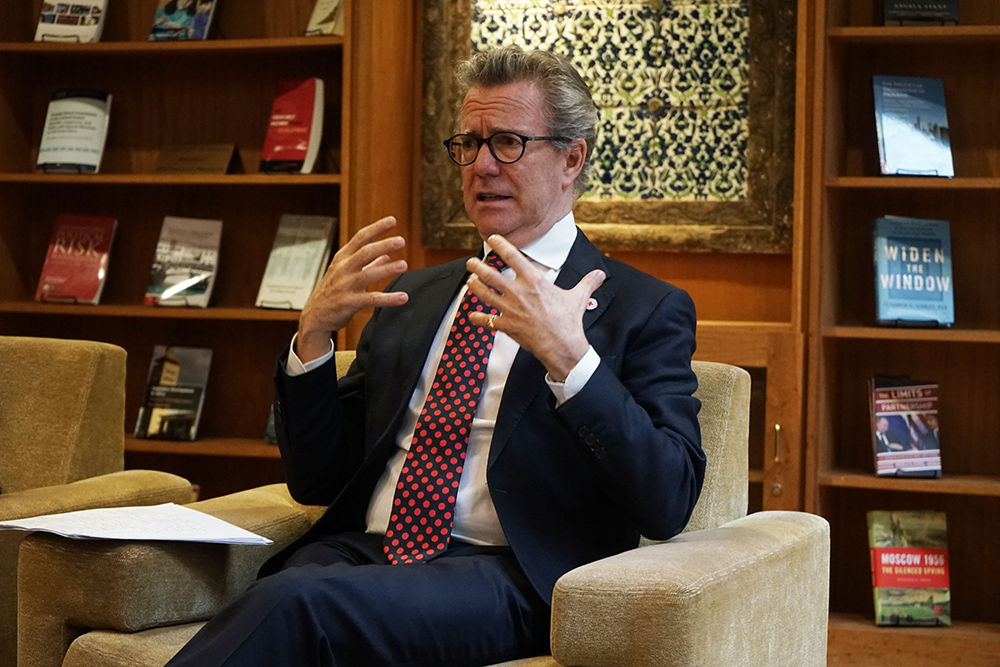Rapid evolutions in cyberwarfare and the advent of climate change require new, sustainable methods for delivering aid to vulnerable populations, Head of Policy and Humanitarian Diplomacy of the International Committee of the Red Cross Hugo Slim said at an event Tuesday.
The Institute for the Study of International Migration, a Georgetown University research center, held the event titled “War and Humanitarian Action in the 2020s” in McGhee Library in the Intercultural Center on Feb. 11. During his talk, Slim discussed the implications of modern warfare and the evolving aid practices in his role at the ICRC.
The ICRC organizes numerous assistance programs to support vulnerable populations affected by conflicts, according to its website. The ICRC has recently committed to integrating economic, social and environmental sustainability into their aid projects.
Developments in cybertechnology have led aid organizations like the Red Cross to reevaluate their traditional wartime policies, according to Slim.
“I think one other thing that’s worrying us at the ICRC is, if so much warfare is going to happen in virtual space — in cyber attacks through computer systems — how can we embody and make present in that space humanitarian norms, humanitarian regulations?” Slim said. “How can we sort of flag and put a Red Cross or a Red Cross Crescent on a hospital in cyberspace?”
The anonymous nature of cyberweapons has complicated battlefield dynamics and raised concerns about accountability, according to Slim.

“We’ve always had false flags and covert operations — hidden operations — in warfare,” Slim said during the event. “Cyber seems to particularly require anonymity because you don’t want the other person knowing how you’re in or that you’re in or who’s in that system.”
The increase in self-operating weapons has generated human desire to control the deadly technology, according to Slim.
“We are saying that, for us, human control means that at any time, when these very sophisticated weapons are in operation across a battle space, semi-autonomously or whatever, many at the same time, there must still be the ability for human command to set the scope of their activities,” Slim said.
Over 30 countries have defensive supervised autonomous weapons, according to The New York Times. A well-known example of the autonomous weapons, the Israel Aerospace Industries Harpy, is designed to crash into the sources of enemy radar signals without a direct human command. Such weapons can destroy their targets before a human-directed counter strike can be deployed.
Prior to joining the ICRC in 2015, Slim served as a senior research fellow at the University of Oxford, researching humanitarian ethics and civilian protection. He has also authored several books, with his most recent, “Humanitarian Ethics: A Guide to the Morality of Aid in War and Disaster,” being released in 2015.
Worsening global climate trends also necessitate a transformation in humanitarian policy, Slim said. Humanitarian organizations must pivot toward better long-term aid practices.
“We’re asked to do it in a sustainable way. We’ve got to keep that system continuity going as well so it’s not just someone giving somebody a glass of water anymore,” Slim said. “We’re gonna make things that you can go on using. This is not a ‘truck-and-chuck’ operation. We’re gonna try and create systems of water, food, health, whatever, that continue. And of course the last one is we have to adapt to climate change and green our own organization. It’s a new ethic for us, to green the ICRC.”
In the face of cyber warfare proliferation, personal interactions between war victims and aid workers must remain a central focus of humanitarian work, according to Slim.
“What really changes what we are to one another is contact, that face-to-face contact,” Slim said. “We know from decades of humanitarian advocacy that it is the face, not the numbers, that make the difference.”




















